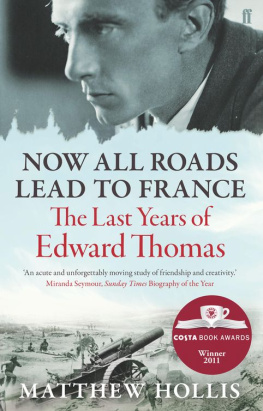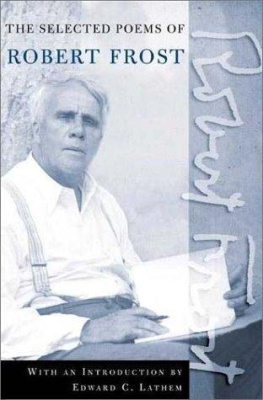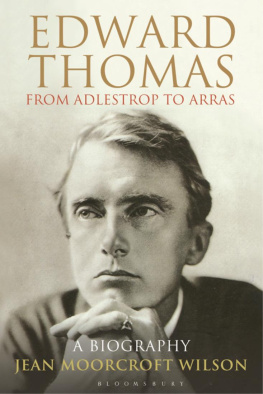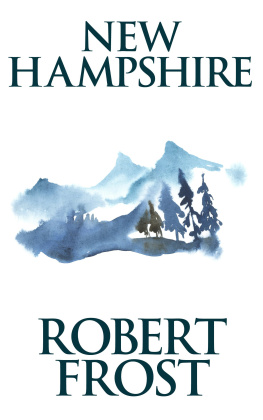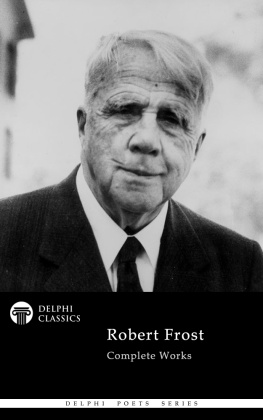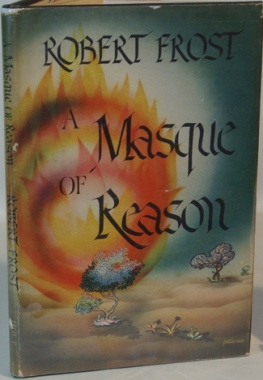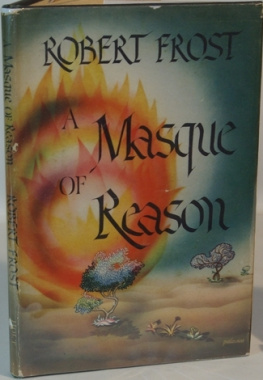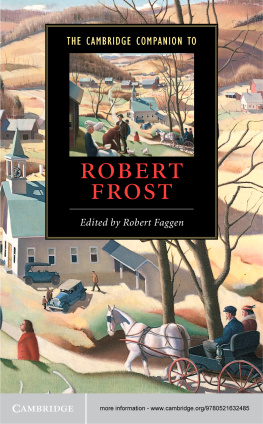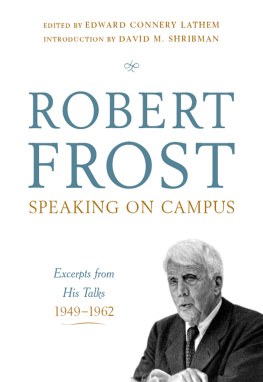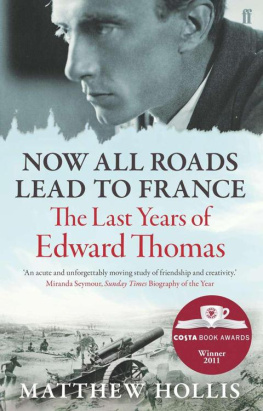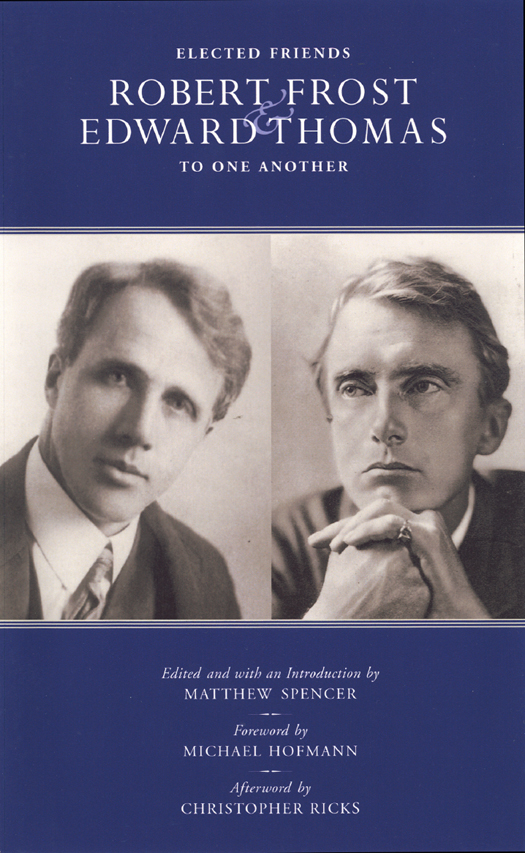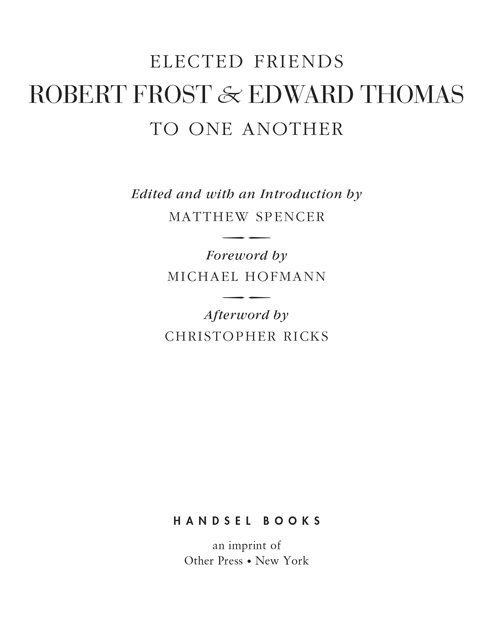To E.T., Iris By Night, Not To Keep, A Soldier, and The Road Not Taken, THE POETRY OF ROBERT FROST, edited by Edward Connery Lathem. Copyright 1923, 1928, 1969 by Henry Holt and Company, copyright 1936, 1951, 1956 by Robert Frost, 1964 by Lesley Frost Ballantine. Reprinted by permission of Henry Holt and Company, LLC.
Robert Frost letters to Edward Thomas from SELECTED LETTERS OF ROBERT FROST, edited by Lawrance Thompson, 1964 by Lawrance Thompson and Henry Holt and Company. Reprinted by permission of Henry Holt and Company, LLC.
Handsel Books gratefully acknowledges its indebtedness to Myfanwy Thomas for her gracious permission to reprint her fathers verse and letters.
Copyright 2003 Matthew Spencer
Production Editor: Robert D. Hack
All rights reserved. No part of this publication may be reproduced or transmitted in any form or by any means, electronic or mechanical, including photocopying, recording, or by any information storage and retrieval system, without written permission from Other Press LLC, except in the case of brief quotations in reviews for inclusion in a magazine, newspaper, or broadcast. For information write to Other Press LLC, 2 Park Avenue, 24th Floor, New York, NY 10016. Or visit our Web site: www.otherpress.com.
The Library of Congress has cataloged the printed edition as follows:
Frost, Robert, 1874-1963.
Elected friends : Robert Frost and Edward Thomas to one another / edited by Matthew Spencer; foreword by Michael Hofmann; afterword by Christopher Ricks.
p. cm.
Includes bibliographical references.
eISBN: 978-1-59051-580-8
1. Frost, Robert, 1874-1963Correspondence. 2. Frost, Robert, 1874-1963Criticism and interpretation. 3. Poets, American20th centuryCorrespondence. 4. Thomas, Edward, 1878-1917 Correspondence. 5. Authors, English20th centuryCorrespondence. 6. Poets, Welsh20th centuryCorrespondence. 7. CriticsGreat BritainCorrespondence. 8. Thomas, Edward, 1878-1917Poetry. 9. Frost, Robert, 1874-1963Poetry. I. Thomas, Edward, 1878-1917. II. Spencer, Matthew. III. Title.
PS3511.R94Z485 2003
811.52dc22
2003017170
Rev.
v3.1
ACKNOWLEDGMENTS
Handsel Books acknowledges Henry Holt and Company for the use of Robert Frosts poetry, and Peter Gilbert, head of the Frost archive at Dartmouth College. We remain indebted to the Edward Thomas Fellowship for their assistance, and especially to Myfanwy Thomas for her gracious permission to reprint her fathers poems and letters.
Finally, the editor is grateful to the following friends and advisors for their generous help and criticism: Archie Burnett, David Ferry, Kenneth Haynes, Christopher Ricks, Stephen Sturgeon, and Harry Thomas. The editorial work was conducted under the auspices of the Editorial Institute at Boston University.
Table of Contents
EDITORIAL NOTE
Three of the letters in this book (18, 19, and 36) I have not seen in manuscript; I have reproduced the texts for these from Lawrance Thompsons Selected Letters of Robert Frost. Everywhere else I have tried to follow the manuscripts of the letters as closely as was practicable when preparing the texts. Cancelled words in the letters were in my judgment of little interest and therefore, in the other interest of the clean page, have not been included in the transcriptions. In all there are just over one hundred such cancellations in the manuscripts, and by far most of these were false starts (e.g., str, or al) rather than completed words. To avoid apparent misprints, I have supplied full stops in brackets wherever they are obviously missing in the manuscripts, numbering thirteen instances total. And I have similarly supplied obviously missing words and letters of words, numbering nine instances and four instances, respectively. I have also supplied one colon. Otherwise both the spelling and punctuation follow the manuscripts exactly. In the case of Thomass letters, I have not indicated the curious gaps that often punctuate his sentences, though these can sometimes be of very great interest.
It should be noted of the correspondence printed here that it is an incomplete record. This is especially true of Frosts side of it. For it is clear from Thomass letters that Frost wrote at least another eighteen letters to Thomas that I have been unable to locate. Though Frost admits to being a bad letter writer (August 15, 1916), he was not so bad a one as a glance through this book might suggest.
The texts of the poems, not including those that form parts of letters, are taken from R. George Thomass edition of The Collected Poems of Edward Thomas, and from the Library of Americas edition of Frosts Collected Poems, Prose, & Plays. The texts of Thomass reviews of Frost and of his essay, This England, are taken from Edna Longleys A Language Not to Be Betrayed: Selected Prose of Edward Thomas.
Numbers in boldface in the footnotes, for example [], refer to the number of a letter, poem, or review included in this volume.
INTRODUCTION
I
This is an edition of the correspondence between the American poet Robert Frost and the English poet, critic, and journalist Edward Thomas. It includes not only their letters but also the poems that each wrote to or for the other, the three reviews that Thomas wrote of Frosts second volume of poems, North of Boston, and Thomass essay, This England, a small record of the time he spent with Frost at Ledington in August 1914 and of the fateful realization that began to crystallize in his mind during that time. It also includes one letter from Thomas to Frosts wife, Elinor, and two letters from Frost to Thomass wife, Helen, in the second of which he very movingly expressed the intense grief that he felt after Thomass death. Together these writings combine great literary interest with a greater human interest, documenting as they do both the thoughts of two important poets as well as the relationship of two remarkable friends.
For literary interest there is especially the story, in late 1914, of Thomass blossoming as a poet, a blossoming due partly to Frosts genial and congenial influence. Overlapping with this story is that of Frosts achieving a long-sought-for critical recognition as a poet, for which he owed some thanks to Thomas and his three insightful reviews of North of Boston. By these reviews, as Frost later wrote to Grace Walcott Conkling, Thomas gave me standing as a poet he more than anyone else; but Thomas also helped himself with these reviews, for his witnessing and testifying to what Frost had done for poetry helped him to firm up and give shape to critical inclinations he had been moving toward on his own for some time.
Intertwined with Thomass poetic evolution is the humanly interesting story of his decision to enlist in the British Armyhis evolution into a conscious Englishman, as he put it to his friend Jesse Berridge in a letter dated September 3, 1914. In August 1914, at the same time as Thomas was sending out his reviews of Frosts book, the Great War was breaking out in Europe. The war, and the ill-effects he knew the war would have on his ability to earn a living by his pen, his close friendship with an American, and the opportunity that came with this friendship of getting away from England and trying his luck for a time in America, all naturally led him to a reevaluation of what England meant, of who he was, and of what he needed to do. It all played a part in Thomass becoming first a poet, and finally a soldier.


